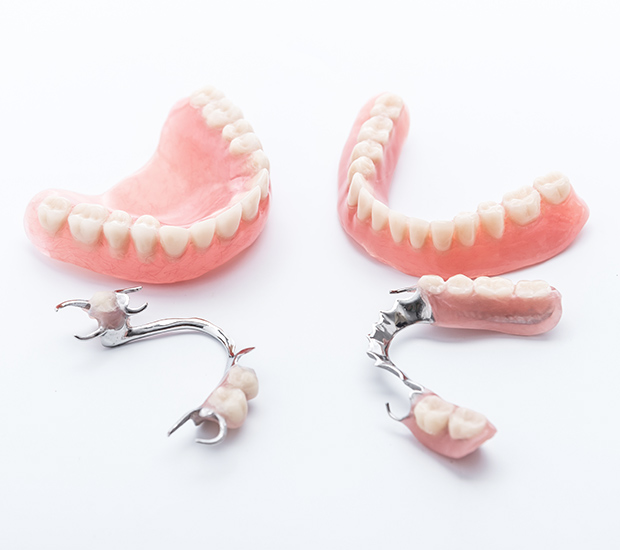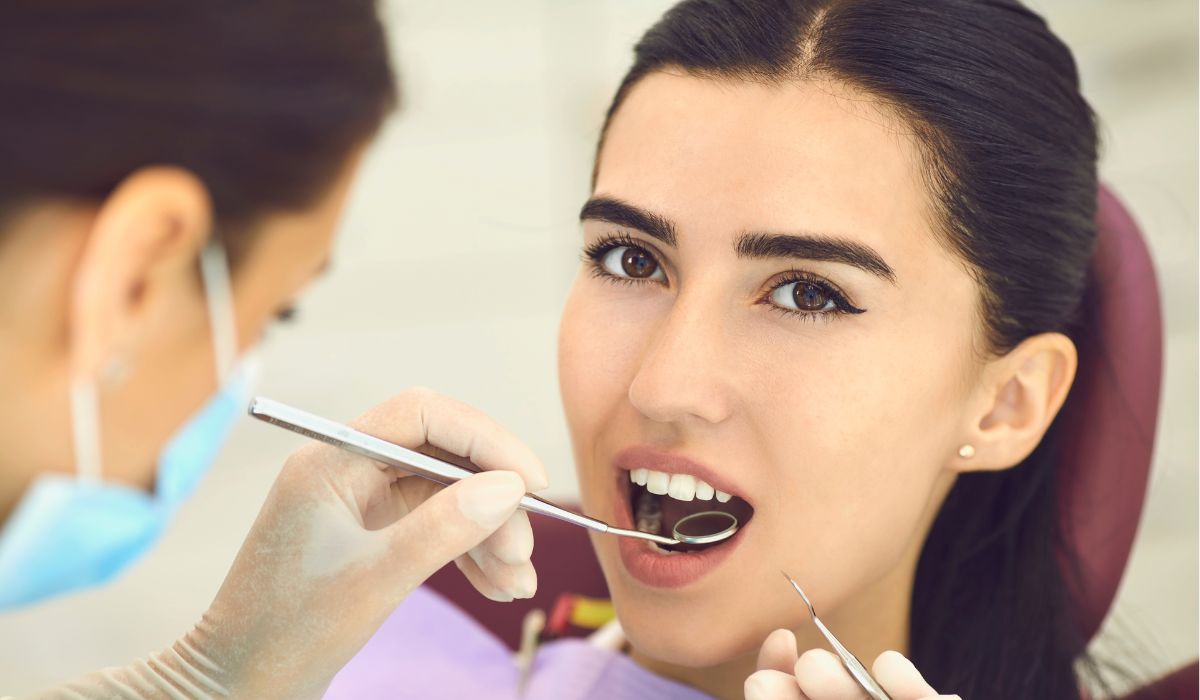Dentures and Partial Dentures Simi Valley, CA
When it comes to lost teeth, there are many practical replacement options to restore one's smile. Missing teeth are not just a question of appearance; they also affect the health of the remaining teeth as well as everyday comfort. Dentures and partial dentures are popular tooth replacement options that are customized for an optimal fit.
Dentures and partial dentures are available at Alamo Family Dentistry in Simi Valley and the surrounding area. We use high-quality materials and advanced fitting techniques to support your comfort and dental health. With our help, you can select the type of denture that will work for you.
Get in touch today by calling us at 805-520-1711 to discuss how dentures can improve your quality of life.
Benefits of Getting Dentures
It is normal for people to be nervous about getting dentures and partial dentures. Replacing teeth is an essential step in a person's journey to achieve the oral health they want. Dentures are natural-looking. When in place, dentures do not look awkward or clunky. Dentures have strong artificial teeth and allow patients to eat many of their favorite foods. Also, this treatment can last for ten years or more, depending on how well the patient will take care of the dentures.
According to WebMD, wearing dentures can improve a person's smile. No longer does the patient have to hide a toothless smile but can instead open up without feeling embarrassed or ashamed. Showing off one's smile can make it more comfortable to meet new people, speak in public, socialize, and get back activities they once did. Dentures will typically not cost as much as some other treatments. Some insurance plans may even cover some of the costs. If your considering dentures, talk with your insurance provider to see what parts of the cost are covered.
Check out what others are saying about our denture and partial denture services on Yelp: Dentures and Partial Dentures Simi Valley
Importance of Replacing Teeth
Since the teeth play a crucial role in multiple aspects of one's life, it is essential to keep up one's oral health routine. If one tooth has an infection, then there is a chance of it spreading to other teeth and the jaw. Plaque that remains on the teeth long enough can cause decay and lead to tooth loss. Fortunately, we can use dentures and partial dentures to restore a smile and boost oral health.
Along with functioning in the same way teeth do and providing the appearance of a natural smile, dentures can replace damaged teeth that cause the patient pain. While the patient can take necessary steps to prevent tooth loss, oral hygiene may not be enough once the infection reaches a more severe stage. In other cases, patients may have a gap or several gaps due to missing teeth.
Once permanent adult teeth fall out, there is no way to grow new ones. Thankfully, we can use dentures or partial dentures to replace them. Dentures will replace an entire row of teeth along the upper or lower jaw, while partial dentures can replace several teeth or half of a row of teeth.
Dentures vs. Partial Dentures
As discussed in an article by the Oral Health Foundation, there are differences between full and partial dentures. Full dentures are a good option for patients who have no remaining teeth, or whose damaged teeth are beyond repair or salvaging.
Meanwhile, a partial appliance makes sense when the person still has some natural teeth remaining. At Alamo Family Dentistry, we can fit patients with either one of these mouth appliances.
Permanent Dentures
There are forms of permanent dentures as well, though these may not be as common as the removable type. Permanent dentures can be more secure and durable. With permanent dentures, we anchor this apparatus to the jaw with implants. People choose these dentures to help avoid the embarrassment of the appliance slipping out while speaking or eating.
Deciding If Dentures Are Right for You
Living without teeth can be difficult, both physically and emotionally. People who are missing teeth recognize the need to replace them but may not know which option is right. Patients should speak with our staff about dentures and partial dentures, along with other possibilities.
We can help patients who are researching the pros and cons of each tooth replacement option. If there are any concerns or questions about dentures, patients can ask our staff.
How Dentures Work
The doctor should speak openly to their patients about dentures and partial dentures. Patients need to understand the benefits and possible drawbacks of this treatment. Unlike implants and bridges, dentures are removable. This apparatus consists of a gum-colored acrylic base and artificial teeth.
The teeth usually consist of metal, covered in plastic. The patient will fit the dentures over the gums. Denture adhesive products are available to help keep the appliance firmly in place in the mouth. After a few days to adjust, the patient should not experience discomfort or irritation when wearing the dentures. If pain persists, contact your dentist.
The Process of Getting Dentures
Our dentist will first meet with the patient to discuss the treatment and what to expect. Team members will take X-rays and make impressions of the patient’s mouth. These will go to a lab technician who can customize the appliance for the patient. At this first appointment, our dentist may remove any decayed or severely damaged teeth. If necessary, this may occur at a subsequent appointment.
Once the dentures are ready, the patient will return to Alamo Family Dentistry for the fitting process. This appointment will also happen after the gums have healed following any tooth extractions. In making sure the dentures fit correctly, we will also make any adjustments when necessary. Once complete, the patient will be able to bite down without issue.
Follow-Up Care
All types of medical and dental procedures have potential side effects. Fortunately, getting dentures is less risky than other tooth-replacement options. It can take some time for the wearer to adjust to having dentures in the mouth. After several days, the wearer should feel comfortable. There may also be some minor pain, soreness, and irritation in the gums. Patients should contact our office right away if these problems persist.
It is still essential for patients to visit our office for regular dental appointments, even after getting dentures. Our dentist will examine the patient’s gums and will also make sure the dentures still fit well and are functioning correctly. Once the appliance starts to wear out, we can make a new one for the patient.
Other Tooth Replacement Options
In addition to dentures and partial dentures, patients may want to consider other ways to replace missing teeth. When deciding which option to choose, there are a few factors to consider, such as cost, general dental health, and your lifestyle.
While implants are most likely to create the feeling of having a natural set of teeth, they are not always a feasible option. Cost is a top concern, especially when many or all teeth need replacement. According to WebMD, gum and bone health is important for successful implants.
Another option is an implant- or tooth-supported fixed bridge. This works similarly to the implant-supported denture but is not removable. Instead of clipping on to the teeth or implants, however, the bridge is affixed with cement or a screw. In addition to costing more than dentures, this option does not work with all configurations of missing teeth.
In the case of missing front teeth, dentists sometimes recommend a resin-bonded bridge. It is not very durable, which is why it is not used to replace other types of teeth that typically take more strain when chewing. It consists of a tooth replacement held on two wings that attach to the insides of the natural teeth on either side.
How to Care for Dentures
Dentures do require ongoing maintenance outside of the typical oral hygiene routine. Many people believe they can set dentures down by the side of the bed. However, this can lead to warping and cracking over time.
Instead, patients should soak dentures overnight. Avoid hot water, as this may also cause warping. Patients who use denture solutions should rinse thoroughly before replacing as denture solutions should not be ingested. Our team can recommend if solution is right for your regimen. Remember never to use these directly in the mouth, either.
It is also important to note that dentures require cleaning, just like regular teeth do. Whenever possible, remove dentures after eating or drinking and rinse them to get rid of food particles. Patients should also brush dentures at least once per day. Dentists recommend a soft-bristled brush as a more abrasive brush may cause damage over time.
Even if no teeth remain, continued dental hygiene is essential. Brush the teeth and gums and floss any remaining teeth. Patients may also use gauze or a soft toothbrush to clean the cheeks, roof of the mouth, and even the tongue. Finally, people who use adhesives should take care to remove this.
Common Misconceptions About Dentures
At Alamo Family Dentistry, we hear a lot of myths about dentures. In some cases, people have inaccurate information about this treatment. We make sure every step of the procedure is explained in detail, and we are always willing to answer any questions our patients may have.
Myth: Dentures are only for older adults
Some people may think dentures and partial dentures are only for older patients. In actuality, many patients in their twenties and thirties wear dentures too. An independent marketing data firm called Servata found that 53% of denture wearers were at or under 44 years of age based on an online survey of 500 U.S. adults. While younger patients may be more frequent wearers of partial dentures, older patients are indeed more likely to be wearers of a complete set.
Myth: Dentures last forever
There is a misconception that once a patient has dentures, it is not necessary to schedule future appointments with the dentist. You still must go to the dentist twice a year for routine checkups. Dentures may also loosen, requiring a dentist to be readjusted. These consultations are crucial for identifying other oral issues, such as gum conditions.
Myth: Dentures feel uncomfortable
While it is true that dentures will take some time to grow accustomed to, most people feel comfortable with the appliance within a few weeks or even days. We can help resolve any concerns people have about the way the dentures fit or function.
Questions Answered on This Page
Q. Are there different types of dentures?
Q. Are there dentures to replace a few of my teeth?
Q. What are the benefits of dentures?
People Also Ask
Q. How do I take care of my dentures?
Q. What do I do if I damage my dentures?
Q. What do I need to know about making adjustments to my dentures?
Definition of Denture Terminology
- Alveolar Bone
- The alveolar bone is the bone surrounding the root of the tooth that keeps the tooth in place.
- Clasp
- A clasp is a device that holds a removable partial denture prosthesis to the teeth.
- Denture Base
- The denture base is the part of the denture that connects the artificial teeth with the soft tissue of the gums.
- Edentulous
- Edentulous is a term that applies to people who do not have any teeth.
- Periodontal Disease
- Periodontal disease is a condition that causes inflammation of the gingival tissues and membrane of the teeth, leading to tooth loss without professional treatment.
- Pontic
- Pontic is another term for an artificial tooth on a fixed partial denture.
- Rebase
- Rebase is the process of refitting denture prosthesis by replacing the base material.
- Reline
- Reline is when a professional resurfaces the surface of the prosthesis with a new base material.
- Resin/Acrylic
- Resin and Acrylic are resinous materials that can be components in a denture base.
- Stomatitis
- Stomatitis is the inflammation of the tissue that is underlying a denture that does not fit properly. It can also result from other oral health factors.
Back to top of Artificial Teeth




